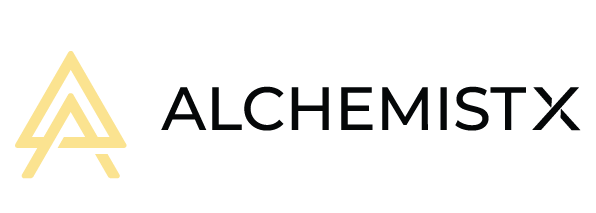In this episode of Innovators Inside, Hong Kong–raised entrepreneur and two-time TEDx speaker Yunsu Tang shares her journey from a stable corporate career in Hong Kong and Shanghai to rebuilding in London’s startup ecosystem.

AlchemistX: Innovators Inside
E.15 - Mayra Ceja: Ender's Game
Published on
July 22, 2021
"In order to create change and really drive Innovation, you have to start with a start-up mindset and be able to move quickly." - Mayra Ceja
Show Notes
Rachel Chalmers:
Today's guest is Myra Ceja, a sales and marketing expert, Venture Capitalist and podcast host on a mission to help startups grow. She's currently head of Business Development and Partnerships for HubSpot and the host of Venture Unplugged. She received her MBA from Wharton and her BA from Princeton, where she spent nine years as president of the Princeton Entrepreneurs Network and led 21 Investments for Princeton University's first seed fund.
Myra, it's so great to have you on the show.
Mayra Ceja:
Hi Rachel. Thank you so much for having me.
Rachel Chalmers:
It's a pleasure.
At Princeton, you represented entrepreneurship and Innovation within what's effectively a huge company in the business of higher education. Can you talk about the perks and challenges of that role?
Mayra Ceja:
Absolutely. By design, when you're inside a 200 plus year old institution, you have to deal with a lot of institutional inertia and bureaucracy. Which can be familiar in any Corporate setting. Now in order to create change and really drive Innovation, you have to start with a start-up mindset and be able to move quickly. So the whole process is actually very similar to the way a founder will go through launching a company. It all starts with having a vision, a mission, and then being able to create a mission that really inspires in the lines of both internal and external stakeholders. You want to work through each stakeholder, get them on board, and then once you get the green light to execute, the hard part actually starts. Which is then delivering a clear plan, making sure that you have the right KPIs, and continuing to iterate quickly.
For your last question, when you think about how it was accepted in terms of the community, we really want to be thinking about wide adoption. For us, the Princeton community has always had a long-term tradition of Innovation and entrepreneurship. Whether it's from top founders like Jeff Bezos, Nick Faustus who started jet.com, or Lauren Bush at feed.com. All of this rich history really ties together to really support our mission for Innovation.
Rachel Chalmers:
Did you see a lot of pushback from folks within Princeton who were suspicious of these changes?
Mayra Ceja:
No, I think one of the key things is to figure out how to communicate a very large ambitious goal. And I think when you look at where my strengths are, it's really to be able to take very complex ideas, very ambitious goals, and then being able to communicate those as to how they actually benefit the community. And once you're able to do that then you really get people to rally around it.
Rachel Chalmers:
What were some of your KPIs? What did people measure you against? And how did you do against those goals?
Mayra Ceja:
So when we were looking at KPIs, one of the things that was clear and foremost was asking, “How many founders did we fund and how do we set up a good cadence for that?” It's not just investing in the most, but you actually want to be looking at how successful they are. In addition to the number of startups that we founded, we looked at how often they got follow-on rounds, or were there any other metrics of growth such as revenue, or community building? And from there, that's how we're able to tell a narrative and a story in terms of how successful each quarter was.
Rachel Chalmers:
And when you look back over that experience, what are you proudest of?
Mayra Ceja:
One of the things that I'm very passionate about is actually providing access and opportunity to female and diverse founders. One of the exciting female founders that I invested in was Danielle Cohen-Shohet. And she was the founder of this small start-up called GlossGenius. It was a startup that had been struggling to get VC funding attention because it was a vertical SAS company appealing to a very unique demographic. This appealed to small businesses that were particularly tailored to hair salons. So this is a great example of a female founder who has a very unique insight into unique pain points, and that is able to address it with unique problem solving. Yet that might not be as widely or commonly funded. And so, having a seat at the table during those investment discussions, I think really bring about that change of perspective in the minds of what SAS traditionally looks like.
Rachel Chalmers:
Did you find that particularly with your female founders, they faced the same challenges in downstream fundraising even if they'd got that boost from Princeton, they still faced the same prejudice when they went out to other institutional investors?
Mayra Ceja:
I think it's a great starting point. So that was really part of the intention. Once you get one top accredited investor, it can actually help deliver that next conversation piece to other well-known institutional investors. That's really what we saw. That it actually helped not only tell that narrative of, “Hey this large institutional investor is backing us, but also we had a set of mentors and included our investment committee.” This would then open up doors and make introductions that were needed and much welcomed for these female founders.
Rachel Chalmers:
It's a matter of getting your foot in the door and then being able to make change from the inside.
You've had so many successes. If you had one do-over, what might you do differently?
Mayra Ceja:
I actually thought about this recently. For me, it would be understanding the power of social media much earlier on.
We've talked about how I have my own personal podcast, Venture Unplugged, and almost every day I really see how powerful of a platform it is. Not only as my personal brand, but also in the massive reach that it can have. Over the last year, I think this is actually one trend that has changed a lot, which is that now your physical presence isn't always necessary to be able to communicate one-on-one with people or even the larger audiences.
So my theory is actually that going forward, your digital presence is going to be even more important than your physical presence. So I do want to encourage everybody whether you're an employee at a corporation, a founder, or an aspiring tech person, to think more about how you can influence your digital presence. And I also want to encourage people who may think that it might be too late to get started that it's actually not. There's an old saying that says, “The best time to have planted a tree is 12 years ago, but the second best time is today.”
Rachel Chalmers:
What do you think makes Innovation so difficult? In particular, this kind of Corporate Innovation you were doing within Princeton where you're pushing against a large existing institution.
Mayra Ceja:
You know, change is incredibly hard for a couple of different reasons. One of them is that most people really prefer the sense of stability and comfortability. You should consider yourself a founder if you're pushing Innovation. You're creating something out of nothing. You, in essence, have to make people uncomfortable. You have to bend, what is normally thought of as the traditional way and force a different outcome. For that you need to be able to paint that picture that I talked about and create that mission that really rallies people. You have to get people to commit to it and rally around you. So it's ultimately about upending these strong power structures, forcing an outcome, and then being able to create momentum to really drive through that change and actually see it happen.
Rachel Chalmers:
How would you distill all of this experience into say, two or three lessons for our listeners?
Mayra Ceja:
I think that you always want to be thinking about your personal life. Whether it's your career, whether it's Innovation - really as taking complete ownership. And what I mean is that you want to be making a plan for where you want to be headed, drive that plan, and see it through. I always believe that you should be absolutely action-oriented and be the entrepreneur of your own life. Ultimately I think that has served me well. It’s this idea that you should always create urgency as a habit and you should envision where you want to go, otherwise you get taken in different directions. The best way is if you're in the driver's seat and you can command your own adventure.
Rachel Chalmers:
How would you advise someone who is struggling to create that sense of urgency?
Mayra Ceja:
Create your own sense of urgency. It's this idea that you need to have a vision that's compelling enough for you to wake up in the morning. Where it makes those long days very short. Until you're able to clarify that for yourself, you're not going to be able to clarify that for other people and get other people to join your journey. That's ultimately one of the hardest parts. When you look at founders or people that drive Innovation within the companies, what they are very good at is not just charisma. It's the ability to convey a concept, to convey a mission, to articulate the “why” behind it. That's what really gets people together and that's what can help change happen within some of these heavily resistant environments.
Rachel Chalmers:
So what is it for you? What's the vision that gets you up in the mornings?
Mayra Ceja:
It's really driving absolute change within the startup ecosystem and community and whatever that means. Whether doing one-on-ones with founders - part of it is, when I do public speaking or on my own podcast, all of that really helps to again foster this notion of entrepreneurship and further that.
Rachel Chalmers:
How do you think the pandemic might affect corporations in the longer term?
Mayra Ceja:
The pandemic has had a massive acceleration for a couple of concepts. One of them I think is this work from home concept or becoming a remote first culture. That can mean a couple of different things. You're seeing companies start to adapt from %100 remote to 50% remote. But whatever that discretion is, you are seeing this pull from employees demanding some flexibility in their work schedule. And also having had a full year to really prove to their corporations that they can be just as productive, if not more. That sense is ultimately going to have longer term effects in regard to how people return back to work. We're seeing a lot of companies really pay attention to this and really try to solve for it.
I think there's a couple of amazing companies that are doing this well. I was recently talking to Brex who's gone fully remote. Our company, HubSpot itself, has gone into a flexible option, and a couple of others. But ultimately, what you want to be thinking about is not just solving for the physical space, but you also want to be solving for culture. That's going to be where we want to be paying attention. How do you build a strong culture that can then help employees feel that sense of belonging so that they can actually be their best selves and bring their best selves to work? Wherever that is. Drive those results that are needed.
Rachel Chalmers:
So as an introvert, I've really enjoyed working from home and having lots of downtime. Are you more of a work from home person? Or do you think you'll move into the hybrid model?
Mayra Ceja:
Oh, I'm a hybrid person. I consider myself an extrovert-introvert, which means for me, I love being in large crowds and feeding off the energy of people. But then I also enjoy that down time and having that time to think, to really strategize, and put some thoughts together. And that time then helps to reinforce some of my more public activities.
Rachel Chalmers:
Which is a great segue to my next question, how do you avoid burnout?
Mayra Ceja:
Burnout is definitely a real thing!
The way I think about burnout is that it actually happens from not being mindful about recharging. Everybody needs to figure out what recharging means for them. So for me it includes taking care of physical health and also mental health. Make sure that you're taking preventative measures and being proactive. I like to have a good morning routine that includes exercise, meditation, and a gratitude journal that I started a couple of years ago. It really just helps to center the day. Set your intention for the day to prevent some of that burnout that can happen.
You always want to be thinking about your biggest constraints in life. It's not just money, it’s time and energy. Be able to make sure that you're able to operate at your peak performance from an intentional point of view rather than a reactive point of view. It’s the key to long-term success.
Rachel Chalmers:
Could you share with us the intention that you set for today?
Mayra Ceja:
First of all, I was very grateful to have this invitation to be on your show. When I sought my intention, it was really to be completely open and allow for my words to transcend and hopefully connect with somebody out there.
Rachel Chalmers:
How do you decide on an intention for the day? What's your criteria for choosing one?
Mayra Ceja:
I look for what could be the biggest thing with the longest impact on that day. I do this also on a weekly basis. You can't focus on too many things at once. The key with any strategy is to focus on only a few things and also decide on the other things that you won't be able to focus on. I ask myself, what are one to three things that I absolutely have to do today? Which are going to have the widest impact that week? And this applies to my career or whatever it is.
Rachel Chalmers:
You mentioned your podcast. What is the best way for our listeners to connect, or follow your work?
Mayra Ceja:
I encourage people to check out ventureunplugged.com You can also follow me on Twitter. And if you ever want to connect with me in terms of HubSpot, you can also check out hubspot.com/startups. Or you can DM me directly on LinkedIn.
Rachel Chalmers:
What does the future look like for you personally? What do you think about the next five years and how to get where you need to be?
Mayra Ceja:
I am absolutely excited about the future. But I think I've always been a general optimist. One of the things that excites me about the future is looking at how the pandemic has accelerated technology and how I’ve become a digital-first person. It’s been interesting to see Corporations that have had to become digital first in order to remain competitive.
You can see this whether it's at my current work at HubSpot or it's looking at how startups are being developed and where Innovation needs to happen. It really excites me to ask how the world is changing. How is it going to adapt? What new technologies are going to come out of it? How do we go to that next level?
Rachel Chalmers:
I'm granting you a wish, and for the next five years, everything in our industry goes exactly the way you hoped it would, what does the world look like in 2026?
Mayra Ceja:
I think we’ll be better able to leverage our personal time in the way that we want to leverage it. I think where technology can help is to get rid of some of those mundane tasks or the things that we don't want to spend too much of our personal time on. So that we’re actually able to focus on that one-on-one time with people. I think that personal connections are definitely here to stay. While you may still be working from home, it's really those human interactions that will lead to creativity, lead to those sparks. And then you're able to execute no matter where you are. I think it's really having more flexibility to really enjoy and do the things that you love to do better and choose when and how you want to do those.
Rachel Chalmers:
What are you reading at the moment? Do you have any recommendations for our listeners?
Mayra Ceja:
A little tid-bit about myself. I was a comparative literature major in college. But one thing that I'm reading right now is called Atomic Habits. It’s this idea that if you set one habit, you can hyperlink the next one and it can actually help you start making dramatic changes. And remember, most of the things that you do seem small but the incremental changes - that’s actually where you see the effects. So if you want to start jogging in the morning, it's something as simple as setting a visual cue like putting your tennis shoes out. Then you start queuing yourself and start getting into those habits and developing streaks of success to lead to more success that you can then apply to your work. The more wins you have, you can start lining them up until they lead to those bigger ones.
Rachel Chalmers:
It's been a really popular recommendation. That's not the first time it's come up. But your comparative literature major, I'm going to push you to recommend a fiction as well as a nonfiction read.
Mayra Ceja:
I absolutely love Ender's Game!
Rachel Chalmers:
Wow.
Mayra Ceja:
Yeah I think that really challenges a lot of the technology that is now available or is going to be soon available. I highly encourage people to check that one out.
Rachel Chalmers:
Say more about that. What is it that appeals to you in that particular book?
Mayra Ceja:
It's this idea that it takes you out of your own space. I love to read fiction and nonfiction. I think fiction allows you to use your imagination and creativity and really submerge yourself. So I think that was one of the latest books that I've read where I could literally devour it over the weekend and not even notice time pass by. That's one of the things that tells me it's a good book. When I realize that I'm almost done with it and I'm finally looking up. That's how I can tell it's a good book.
Rachel Chalmers:
Do you see yourself in the protagonist?
Mayra Ceja:
I've always considered myself as a pioneer in trying to break new ground. There's always that element when you look at the leading character, who is the hero of the story.
Rachel Chalmers:
Is there anything else I should have asked?
Mayra Ceja:
I guess the one thing that maybe we haven't covered is what I'm looking at in terms of my personal latest investment, which I'll throw that in as a bonus.
The other thing that's really intriguing to me right now in terms of personal investments is looking at the crypto markets. I think it actually also applies to Corporate Innovation because of their blockchain technology. I think it'll be very interesting to see how companies adapt to blockchain adoption and to currency exchanges. This idea of identity, it's definitely hitting the next wave of evolution so it'll be exciting to see what the future holds for Corporate Innovation in that category.
Rachel Chalmers:
Do you worry about the carbon footprint of particularly the proof of work based blockchain implementations?
Mayra Ceja:
I think that's something that will be solved. I definitely think it's of concern, and I'm hoping that because it's taking a more prominent effect on the world stage, that then we’re able to have bigger discussions around it and hopefully address some of those concerns.
Rachel Chalmers:
As you say we should be curious. It's going to be an interesting time to come for sure.
Mayra Ceja:
Absolutely.
Rachel Chalmers:
Myra, thank you so much for being on the show. It's been a pleasure to have you.
Mayra Ceja:
Thank you so much.
References
Mayra Ceja on Twitter
Mayra Ceja on Linkedin
hubspot.com/startups - To learn more about what Mayra does at Hubspot
mayra.ceja@gmail.com - Personal email address to reach Mayra about ideas and projects
mceja@hubspot.com -Mayra leads VC partnerships at HubSpot and she welcomes you to reach out to her
Venture Unplugged - Mayra’s personal podcast where she interviews leading founders and investors to uncover the challenges of entrepreneurs
HubSpot - Where Mayra works as Head of Business Development and Partnerships
Lauren Bush at feed.com - Mentioned by Mayra as an example of a successful founder
Danielle Cohen-Shohet at GlossGenius - Mentioned by Mayra as an example of a successful female founder she invested in
Brex - An example of a company that has gone fully remote in response to the pandemic
Princeton Entrepreneurs Network - Where Mayra led 21 Investments
Atomic Habits - A book Mayra is reading that helps to create better habits at the individual level
Ender’s Game - A science-fiction book Mayra holds in high regard
Intro and Outromusic composed by: www.PatrickSimpsonmusic.com
Recent Episodes

Why High Achievers Burn Out and How Conscious Leaders Break Through
Why do so many high achievers hit every goal, earn the title, build the company, and still feel lost or unfulfilled? In this episode, Dr. Sharon Spano PhD explains what actually happens when driven founders and executives outgrow hustle and need a deeper way to lead.

.svg.png)









